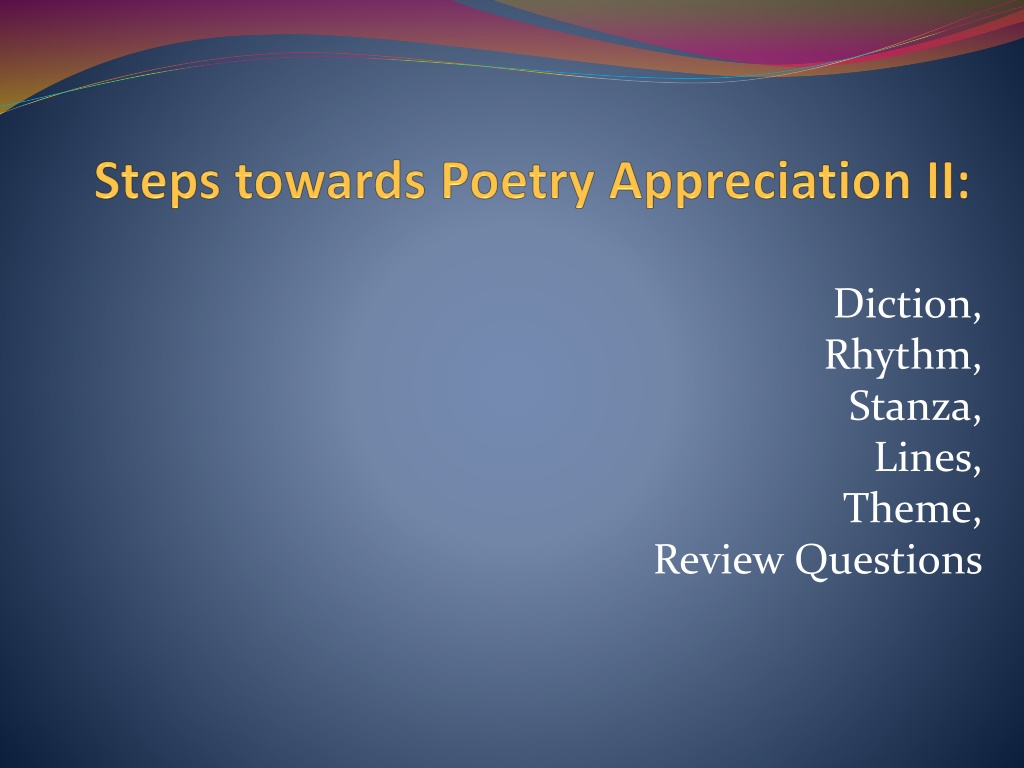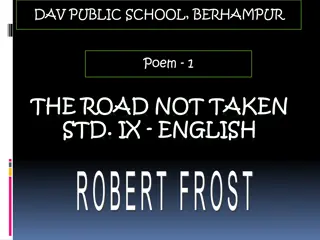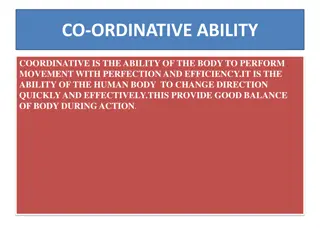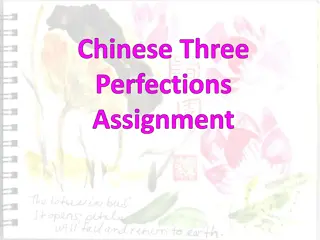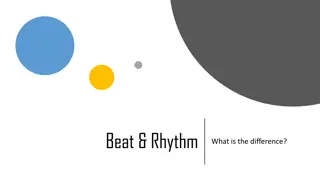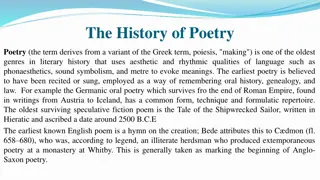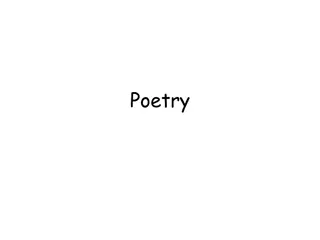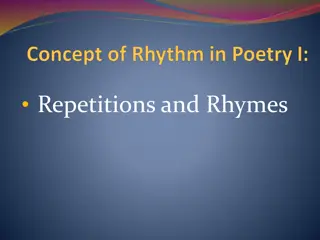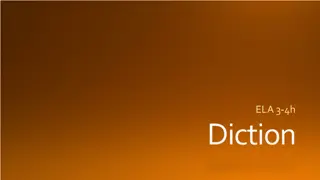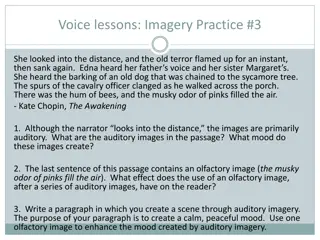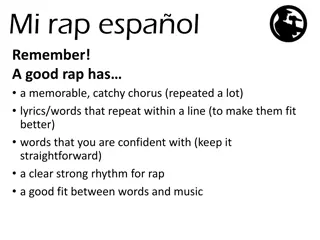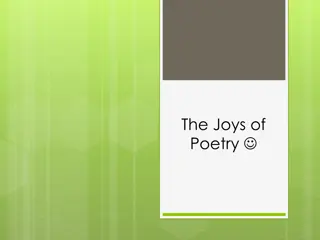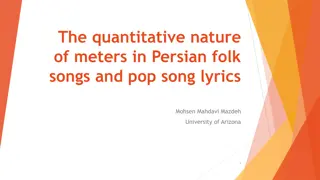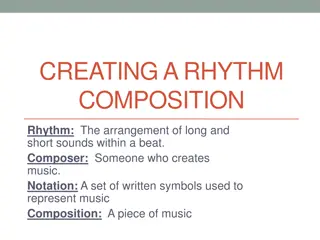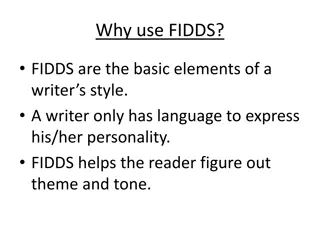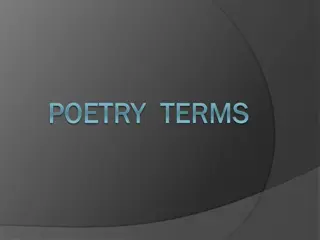Exploring Elements of Poetry: Diction, Rhythm, Stanza, Lines, Theme
Delve into the nuances of poetry with a focus on diction, rhythm, stanza formation, line arrangement, and thematic exploration. Understand how these elements contribute to the mood and meaning of a poem through insightful analysis and review questions.
Download Presentation

Please find below an Image/Link to download the presentation.
The content on the website is provided AS IS for your information and personal use only. It may not be sold, licensed, or shared on other websites without obtaining consent from the author. Download presentation by click this link. If you encounter any issues during the download, it is possible that the publisher has removed the file from their server.
E N D
Presentation Transcript
Diction, Rhythm, Stanza, Lines, Theme, Review Questions
Diction This refers to the type of words that the poet uses in his poem. It also includes the way that the words in the poem are arranged. How far did the arrangement deviate from the normal Language structure? When certain words used by a poet are picked out, you will discover that they invariably add to creation of a particular mood that pervades the poem. Simple Diction When we refer to diction as being 'simple' it implies that the poet makes use of words that are easily understood. The imagery used is easy to comprehend too and the general arrangement of the words does not deviate much from the normal grammatical structure of the language. Complex Diction This refers to a situation where the words used in a poem might a bit difficult to comprehend, or the arrangement of the word does not obey the grammatical rule of the language. Furthermore use of difficult imagery renders the diction of the poem complex of difficult. Generally, it is assumed that when a poet is discussing highly sensitive issues/themes or very serious issues, he employs complex diction.
The Epidemic by Chinweizu When the epidemic of terror erupted A lava of fear enriched the soil; Strong hatreds sprouted on whiffs of doubt Like buds at the breath of spring. A lamb of suspicion hung over the land As men were denounced whose looks were disliked; Coagulated fear and insecurity Made stronger, yet more tenuous ties Than fearless confidence. As sensible bravery Stood rooted in caution, the streets were choked With panicked battalions of frenzied fear. The wraith of distrust, rolling his eyes, And waving a gun, sent shot after shot Into the ranks of barricaded trembling; While terror in terror found a friend (from Energy Crisis and other poems)
Basic steps towards understanding a poem : Diction This poem has a pervading sense of doom and calls up a deep feeling of fear, danger etc. Let us identify some of the words that help realise this mood, they include such words as: 'epidemic,' 'terror,' 'lava,' 'erupted,' hatreds/ doubt,' suspicion,' denounced,' disliked,' 'insecurity,' 'choked,' 'panicked,' 'battalions,' 'wraith,' 'distrust1 etc. You will discover that use of these words that connote danger in the poem creates the general feeling of danger that one feels after reading the poem.
Questions on Diction To find out about the diction of a poem you ask the following questions: What special words does the poet use? Are they adjectival, verbs, or a combination of both? What images do these words connote? For example in The Casualties,' one will discover several adjectives connoting destruction or damage. Does the speaker use slang words? Is his diction formal, or is it standard? What does the speaker's choice of words reveal about him? How would you characterise the diction of the poem?
Identify words associated with violence in The Vultures by David Diop In those days When civilisation kicked us in the face When holy water slapped our cringing brows The vultures built in the shadow of their talons The bloodstained monument of tutelage In those days There was painful laughter on the metallic hell of the roads And the monotonous rhythm of the paternoster Drowned the howling on the plantations. Of the bitter memories of extorted kisses Of promises broken at the pint of a gun Of foreigners who did not seem human Who knew all the books but did not know love. But we whose hands fertilise the womb of the earth In spite of your songs of pride Hope was preserved in us as in a fortress And from the mines of Swaziland to the factories of Europe Spring will be reborn under our bright steps.
Questions on Rhyme This is normally used to underscore the theme of the poem. To find out about the rhyme and its relevance to the poem you ask the following questions: What is the rhyme scheme in the poem? Does the poem employ full rhyme, half rhyme or no rhyme? Does the poem use inter-stanza rhyme? Is the rhyme appropriate to the poem's subject? If not, why not? It should be noted that the absence of a rhyme scheme does not mean that the poem is not 'good' poetry. Just as the presence of an identifiable rhyming pattern does not make a poem 'good poetry. Your intention in asking and answering the above question is to discover how relevant these factors are to your understanding of the poem.
Stanza The arrangement of stanza helps us understand the meaning of the poem. Sometimes they point to the seriousness of the subject being discussed. Poets treating very 'serious' or 'sensitive' issues have generally used the quatrain (four-line stanza poems). Just as the 'heroic couplet' was employed by poets to treat 'serious' matters. Examples are the poems of Alexander Pope and John Dryden. To discover the relevance of a stanza to the poem, you ask: Is the poem written in any recognisableverse form? How many lines does each stanza have? Are the stanzas written in an equal number of lines and in the same rhyme scheme? Is there any significance to the way the stanza breaks? This could be a pointer to the seriousness of the theme of the poem. Some poems will deploy their stanzas to add emphasis to an idea or theme. Some will even underscore an idea by the stanza at a crucial point in the exposition of that idea. Take a look at Onwudinjo's 'Unspoken Agonies' once again. What would you say about the relevance of the last stanza to the theme of the poem?
Questions on Lines Lines Examine the lines of the poem. Is each line a single unit of sense, or does its meaning run on to the next line? What is the effect of the arrangement of the poem's lines on its theme? (For instance, a terse summary sentence may be set off by itself in a line forthe sake of emphasis).
Theme Theme Theme refers to the central idea that the poem communicates. It is customary in writing and talking about poetry to sum up the dominant meaning, effect, or characteristics of the poem into a statement of its theme. Once the theme is extracted from the poem, the purpose of analysis is to demonstrate that the theme is an appropriate hypothesis which can be supported by references to the poem itself. The analysis of poetry by themes gives at best, elliptical results, because themes are subjective views and bother on the philosophical at times. However, it is useful as a method of learning to think abstractly about literature.
Questions on Theme To find out the theme of any poem you ask: What do you think is the central message of the poem? What is the poem trying to teach you? Does your version of its theme account for the major emphasis in the poem? (It must, if it is a good statement of theme) What proof can you adduce from the poem itself, which supports your statement of its theme? Can you give specific questions from the poem to support your version of its theme? If you cannot, then your statement of the poem's theme is probably not appropriate. Is the theme you have inferred from the poem commonly found in Literature? Does the language of the poem; its imagery, rhythm, diction support your version of its theme? Can you demonstrate that the poem technically underscores its theme? The theme you have deduced from a poem must be proved by reference to the poem's form as well as content. ,
Review Questions Practice with any two poems of your choice.
Poetry is fun Thank You
